Coronavirus 23
Mujica backs Cuban doctors for Nobel

Pepe Mujica: “It is an honor to support the candidacy for the Nobel Peace Prize for Cuban doctors”.
 By Maribel Acosta Damas. Cuban journalist, specialized in Television. She is a professor at the Faculty of Journalism of the University of Havana and holds a PhD in Communication Sciences.
By Maribel Acosta Damas. Cuban journalist, specialized in Television. She is a professor at the Faculty of Journalism of the University of Havana and holds a PhD in Communication Sciences.
March 12, 2021
Translated and edited by Walter Lippmann for CubaNews.
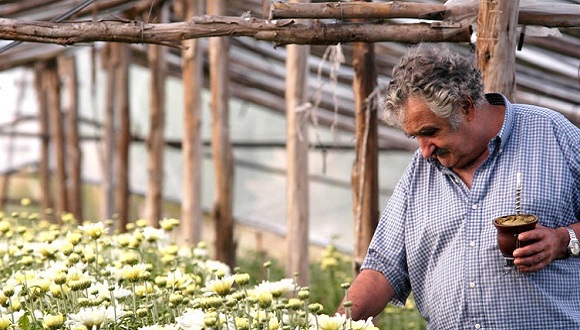
Pepe Mujica, Minister of Livestock and Agriculture in the first government of Tabaré Vázquez in 2005 and then President of Uruguay between 2010 and 2015. Photo: Resumen Latinoamericano.
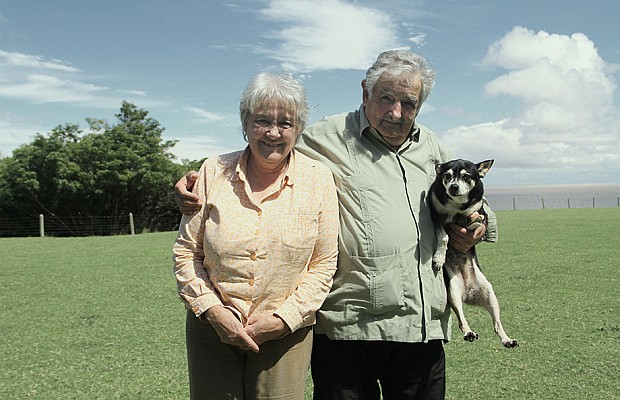
Photo taken from Cubaenresumen.org
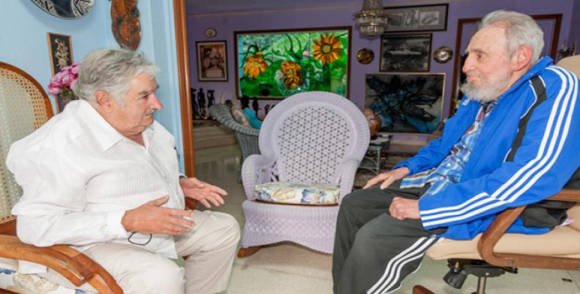
In my living room I have a picture of Che, and I have his letters in my memoirs, in a notebook. It turned out that Evo Morales wanted to make a faithful reproduction of Che’s wallet in the Bolivian guerrilla, the last one he had. Evo Morales had it made as a gift to his friends, and I have it. Inside there is also the facsimile copy of the campaign diary and a notebook… I keep it hanging… and I always show it to them when they come to visit. Che is still there. For us, it is an indelible attitude, no matter how much time goes by…
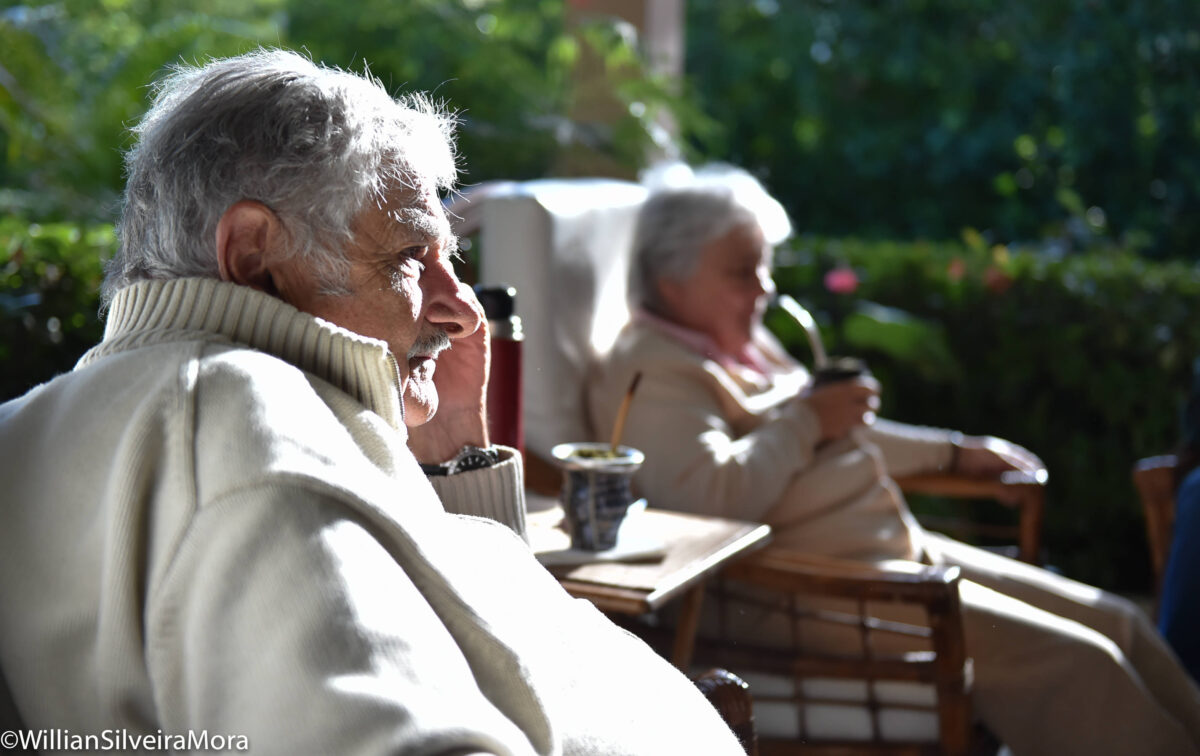
José “Pepe” Mujica and Lucía Topolansky at the Uruguayan ambassador’s residence in Havana, January 25, 2015. Photo: William Silveira Mora
We receive all this when we are born. So we have to try to leave something behind for those who will come after us. The world will not improve if there are no people who are concerned about its improvement. The world improves because of the work of people who make an effort.
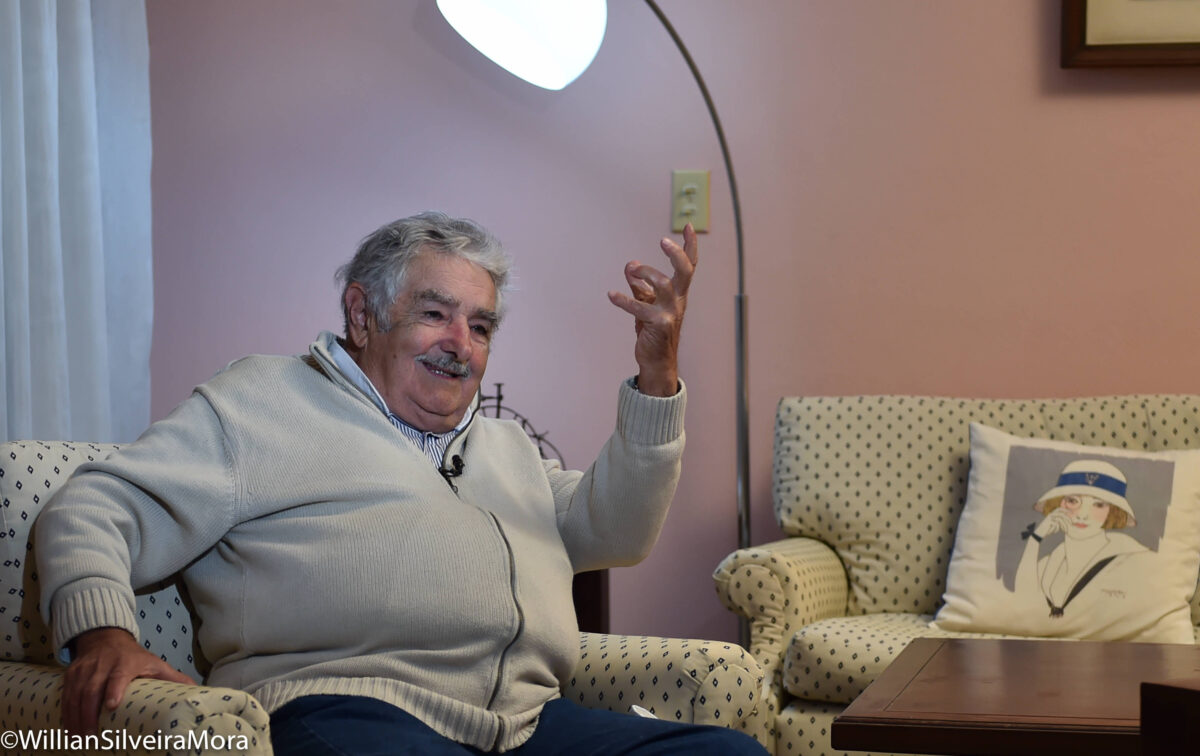
Pepe Mujica gives an interview to Randy Alonso Falcón for the Round Table, Havana, January 25, 2016. Photo: William Silveira Mora
Now there is the internet, there is the university, so it is as if the old people are superfluous, they are left over… It is a world that only wants young people, absolutely young, and then the old men and women disguise themselves to look younger. They all want to be young and they revoke themselves: they dye their hair, they remove wrinkles, they bother with fatness… in short…
Old people are on the way to being discarded. However, sometimes old people see farther because they have lived longer and if they are not yet crippled they have the function of trying to tell things to younger people that probably they are not going to understand them at that moment, but one day they will realize that they did not see part of reality… In Asian villages there is a great reverence for old people, but in Western villages there is no reverence. That is why it is good to retire…
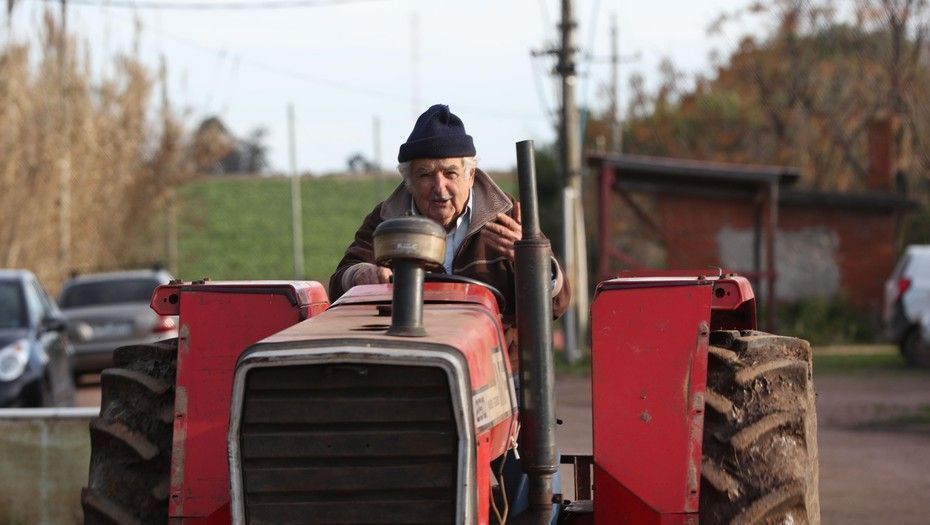
The former Uruguayan president is known for his modest lifestyle and direct speech. Photo: EFE
Vaccination against selfishness and inequality

Vaccination against selfishness and inequality
By: Randy Alonso Falcón
January 27, 2021
Translated and edited by Walter Lippmann for CubaNews.
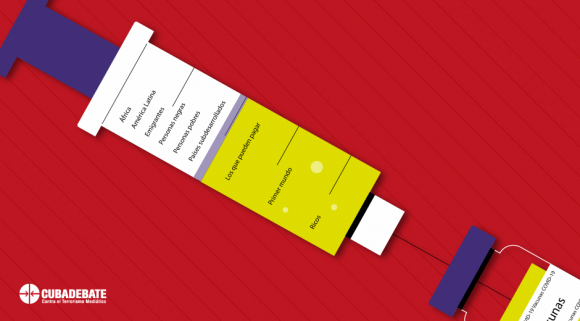 “It will not be an exhausted and outdated world order that can save humanity and create the indispensable natural conditions for a dignified and decent life on the planet. (…) This is not an ideological question; it is already a question of life or death for the human species.”
“It will not be an exhausted and outdated world order that can save humanity and create the indispensable natural conditions for a dignified and decent life on the planet. (…) This is not an ideological question; it is already a question of life or death for the human species.”
Fidel Castro Ruz
Speech at the Open Tribune of the Revolution, held in San José de las Lajas
January 27, 2001
Solidarity and Justice are still words in disuse even when the catastrophe concerns us all, like a great universal Titanic. A tiny and sticky virus has moved fears, shaken societies and health systems, provoked countless reflections on today and the future, but it has not succeeded in making equity and love for others prosper.
This week will mark the 100 millionth person infected with COVID-19 in the world and already more than 2 million people have died.
“Every day the gap between the haves and have-nots grows. The pandemic has reminded us that health and economics are linked and that we are all in the same boat. The pandemic will not end until it ends everywhere,” said World Health Organization Director-General Dr. Tedros Adhanom Ghebreyesus on Monday.
The numbers bear incontrovertible witness to the expert’s assessment.
The privileged cure
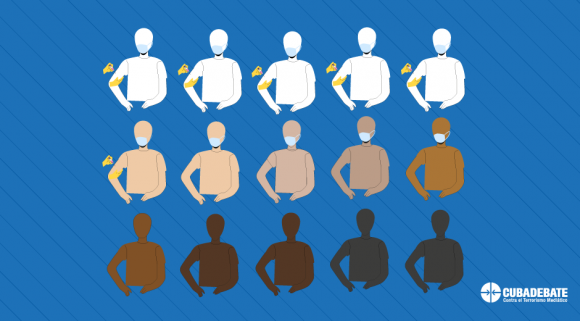
Despite numerous calls from the UN and various world leaders to seek a global response to the pandemic and to facilitate and share access to a cure for the disease, narrow views and deaf ears predominate.
“Science is succeeding, but solidarity is failing,” UN Secretary-General António Guterres noted on January 15. Several vaccines are already available worldwide to tackle the SARS-CoV-2 virus, but access to them is as deeply unequal as the world we inhabit.
Some 66.33 million doses have been administered to date, 93% of which were delivered in just 15 countries: the US, China, UK, Israel, United Arab Emirates, Germany, India, Italy, Turkey, Spain, France and Russia, according to the data analysis platform Our World in Data, based on figures from Oxford University.
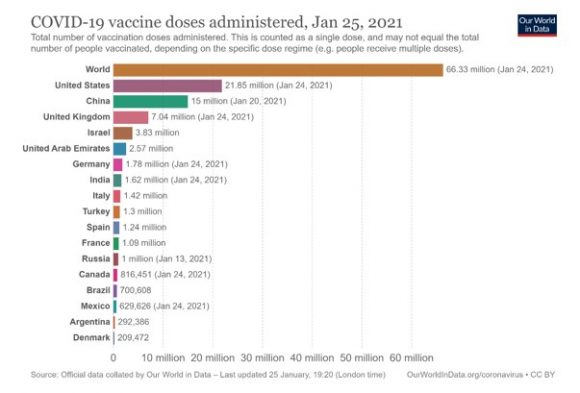
In all of sub-Saharan Africa, only 25 doses of vaccine could be administered in Guinea. Populous countries like Nigeria, with 200 million inhabitants, are waiting for the first dose.
The same scramble that took place at the beginning of the pandemic with lung ventilators, masks and protective suits is now being staged with vaccines: hoarding, overpricing and speculation. “An immoral race to the bottom,” as the WHO’s top executive described it.
The COVAX fund, created as a sort of global effort to make vaccines accessible to the poorest nations or those with limited resources, announced that in February it will begin to deliver the first doses (they first said that in January), but it recognizes that it has been limited by the lucrative agreements of various individual nations with the pharmaceutical companies that produce the anti-COVID vaccines.
Another handicap has been the high cost of the vaccines that have the most international approval so far. As Norwegian expert John-Arne Rottingen told The Guardian, “The difficulty is that we really only have widespread international approval for marketing two vaccines: the two mRNA vaccines. The challenge is that one, the Moderna vaccine is very expensive, and the other, the Pfizer / BioNTech vaccine, which was first available and is now being applied in Europe, is moderately expensive compared to others, and requires a super cold chain. The price and cold chain makes it not the ideal vaccines for a global vaccine.”
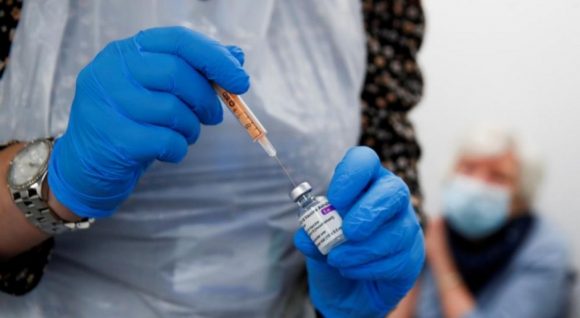
While nations like India and South Africa are calling on the WHO to campaign for pharmaceutical companies to relinquish intellectual property rights to COVID-19 vaccines and treatments. That would allow other qualified manufacturers in the South to expand production of those antidotes; countries like the US, UK and Canada have opposed the initiative. Those three wealthy nations have purchased or reserved enough doses to inoculate their populations at least four times.
High-income countries account for 16% of the world’s population, but hold more than 60% of the vaccines purchased so far.
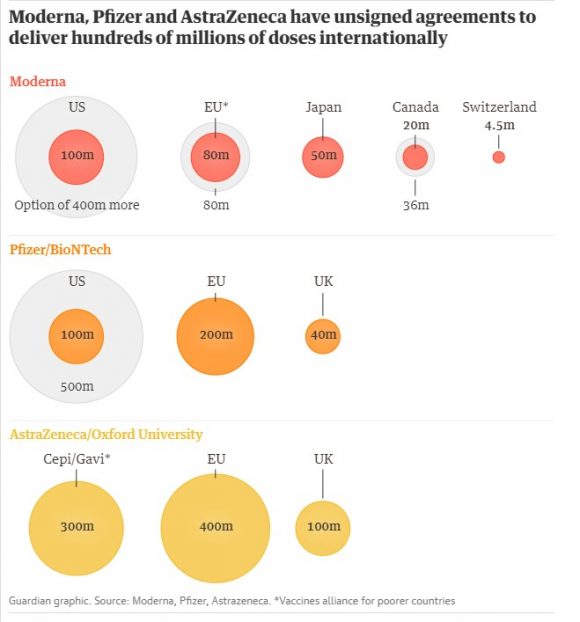
Rich countries account for the lion’s share of vaccine production. Graphic: The Guardian
Some forecasts put the total population of middle-income and poor countries that could be vaccinated this year at 27%. Duke University’s Center for Global Health Innovation estimates that there will not be enough vaccines to immunize the world’s population until at least 2023.
“The world is on the brink of a catastrophic moral failure, and the price of this failure will be paid in lives and livelihoods in the world’s poorest countries,” Dr. Tedros regretfully sentenced.
The virus of inequality
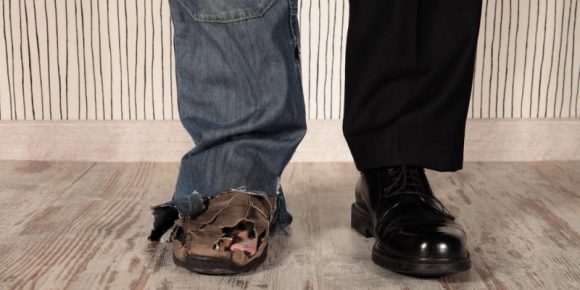
“Vaccine nationalism” is the exact reflection of an unequal and unjust world in which a few remain the great beneficiaries of wealth, for which billions must make do with the leftovers.
It is the “inequality virus” that OXFAM denounces in its most recent report, in which it evidences that the current failed economic system “allows a super-rich elite to continue to accumulate wealth in the midst of the greatest economic crisis since the Great Depression, while billions of people face great hardship to get by.”
While billionaires saw their fortunes increase between March and December 2020 by a total volume of $3.9 trillion-to amass an unimaginable $11.95 trillion-the poorest people on the planet will need “more than a decade to recover from the economic impacts of the crisis” accentuated by the COVID-19 pandemic.
Racial differences have also deepened. In the United States, the most powerful nation on the planet, if mortality rates were equal to those of the white population, nearly 22,000 Latinos and blacks would not have died from the coronavirus outbreak. In Brazil, people of African descent are 40% more likely to die from COVID than whites.
One of the conclusions of the Oxfam report is that “the pandemic is likely to increase inequality in a way never seen before”. The World Bank has warned that, in the current context, more than 100 million people could reach extreme poverty.
The 10 richest men in the world saw their net worth increase by $540 billion in the pandemic 2020 period. That list is topped by Jeff Bezos and Elon Musk. It also includes luxury group LVMH CEO Bernard Arnault, Bill Gates and Facebook CEO Mark Zuckerberg. According to Oxfam, the money hoarded by these potentates would be enough to prevent people from falling into poverty due to the effects of the virus and would also guarantee a vaccine for everyone on the planet.
Sunshine of the moral world
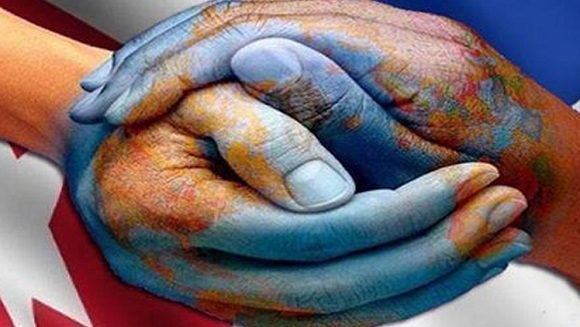
Among so much inequity and indifference, a small archipelago in the Caribbean, called Cuba, has been able to send thousands of doctors and nurses, in some 50 brigades of the “Henry Reeve” Internationalist Contingent, to more than thirty countries in Latin America and the Caribbean, Europe, Africa and the Middle East, to collaborate in the fight against the deadly disease.
Thousands of lives saved or recovered in a scenario of total complexity are the fruit of their solidarity work. The human and professional quality of these sons and daughters of the Cuban people overcomes the most diverse obstacles. It leaves a mark of affection, gratitude and example that is recognized by all those with whom they have shared and whom they have cared for.
That same country, with scarce economic resources but abundant in trained and educated talent, has been able to build an advanced biopharmaceutical industry, which is now preparing to produce 100 million doses of Soberana 02, one of the 4 vaccines on which its scientists are working. This would make it possible to immunize the entire Cuban population (it would be one of the first countries to achieve this) and to have more than 70 million doses available for other peoples of the South. There are already countries interested in acquiring it, such as Vietnam, Iran and Venezuela, Pakistan and India, the Director General of the Finlay Vaccine Institute recently announced.
Researchers from that institution are working with countries such as Italy and Canada to test the impact of the Soberana 01 vaccine on people who have already had COVID-19 and are convalescing, but are at risk of reinfection.
“We are not a multinational where (financial) return is the number one reason. We work the other way around, creating more health and return is a consequence, it is never going to be the priority,” Dr. Vicente Vérez, leader of the main vaccine research center in Cuba, explained to the press last week.
“Our world can only beat this virus one way: united,” the UN Secretary-General recently emphasized. Unfortunately, the vaccines of solidarity and justice have not been able to be applied in the rich world that dominates.
Psychological Management of Isolation

Psychological Management of Isolation
Paradoxically, this dramatic moment for the human being is an opportunity to stop the consequent damage of so many other excesses that put the existence of the planet and life at risk
By Mariela Rodríguez Méndez
April 6, 2020
Translated and edited by Walter Lippmann for CubaNews.
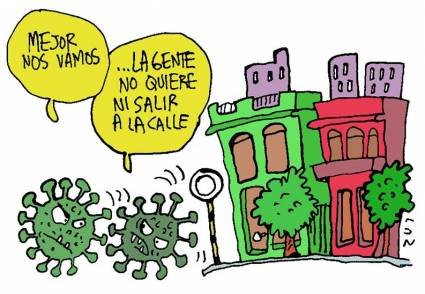 Isolation is an effort for the world economy and subjective, applied with the intention of gaining health and life. Every contagion that is avoided is a way to stop the progression of this epidemic that is costing humanity so much.
Isolation is an effort for the world economy and subjective, applied with the intention of gaining health and life. Every contagion that is avoided is a way to stop the progression of this epidemic that is costing humanity so much.
Paradoxically, this dramatic moment for the human being is an opportunity to stop the consequent damage of so many other excesses that put at risk the existence of the planet and life or its enjoyment.
Pause in the urgency, the haste, the daily race to fulfill, to win, to be successful, to consume, to be in fashion, etc. A pause from those days with the feeling that time was not enough, that what matters most or is enjoyed was postponed. We are invited to a pause for reflection, reorientation, the encounter with the compass that indicates those little things that make us feel and help us to live. This is also a break longed for by many, even if it is difficult to recognize.
It is a pause that will make us look, listen and speak to those who accompany us in the home. It will be an opportunity to rediscover what unites us with them. Perhaps it is also a time to ask ourselves how we would like to live the next isolation, even if that is chosen in the best conditions of a planet pulsating with life and vigor. Isolation to love, work and create.
Baby Born in Isolation Center

Baby Born in Isolation Center
The baby was named Mario Ramses and is in good health with his mother
By Hugo García
April 7, 2020
Translated and edited by Walter Lippmann for CubaNews.

The unexpected birth are samples of the capacity, experience and cohesion of the medical team that works in this isolation center in the city of Matanzas Author: Hugo García Published: 07/04/2020 | 12:27 am
Matanzas: Two extraordinary and emergency events took place during the last days of confrontation with COVID-19 at the Mario Muñoz Monroy Hospital’s isolation center.
First, a Russian tourist who had suffered a hip fracture at the hotel where she was staying was successfully operated on. Then, Dayana Almeida Gómez was assisted in giving birth at the same institution, where she remained suspected of carrying the new coronavirus and there was no time to transfer her to the city’s maternity hospital when she went into labor.
A medical team made up of Doctors Ramses Isaac Marrero, Lourdes Gonzalez Cabrera and Noel Rodriguez Ortiz, assisted by staff from that hospital, brought the 22-year-old to full term. She was admitted on April 2 and was transferred to the provincial maternity hospital on Sunday, April 5.
“I named him Mario Ramses, in honor of the doctor from Moncada, whose name the hospital bears, and Dr. Ramses,” says Dayana, a resident of the Ciénaga de Zapata municipality, who entered as a suspicious case and finally she and her baby were diagnosed as negative.
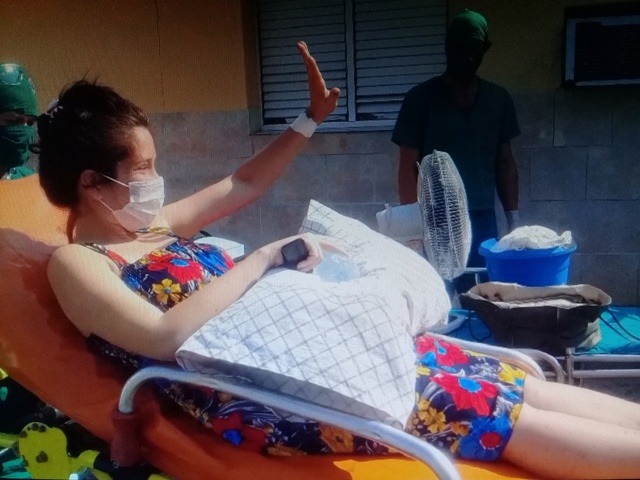
Photos: Hugo Garcia
Both the surgical intervention for the foreign tourist and the unexpected birth are samples of the capacity, experience and cohesion of the medical team that works in this isolation center in the city of Matanzas, from which four patients in good health have already been discharged.
The new mother behaved very well and it was a quick delivery, says Ramses: “We had all the conditions in this hospital, even though normally deliveries are never carried out here. Everything went well and the baby weighed 3,250 grams.
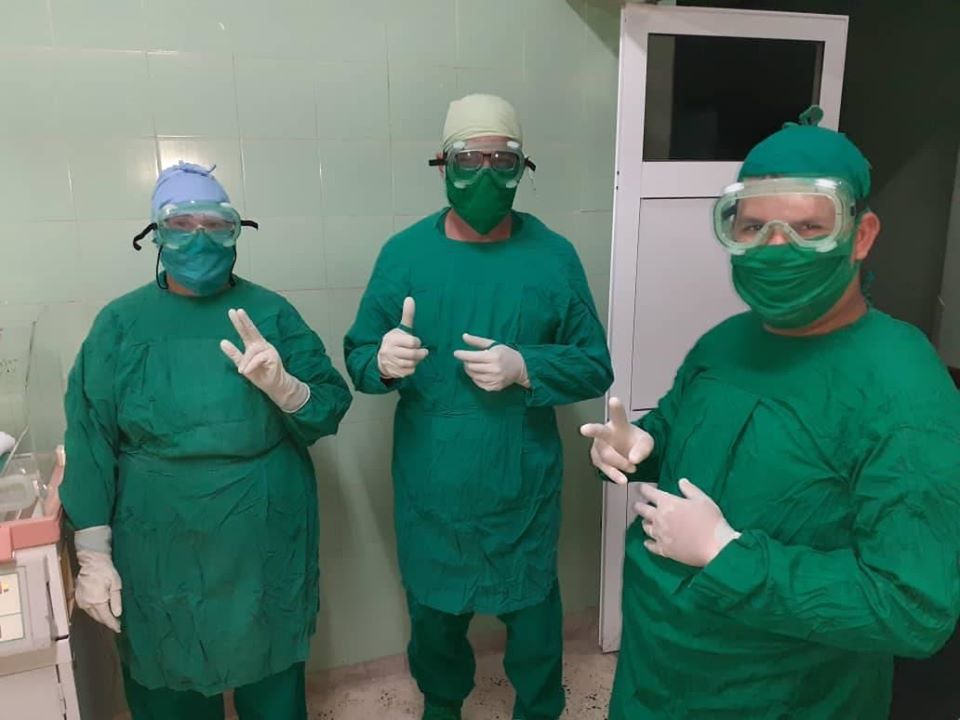
Doctors Lourdes González Cabrera, Ramsés Isaac Marrero and Noel Rodríguez Ortiz
Related photos:
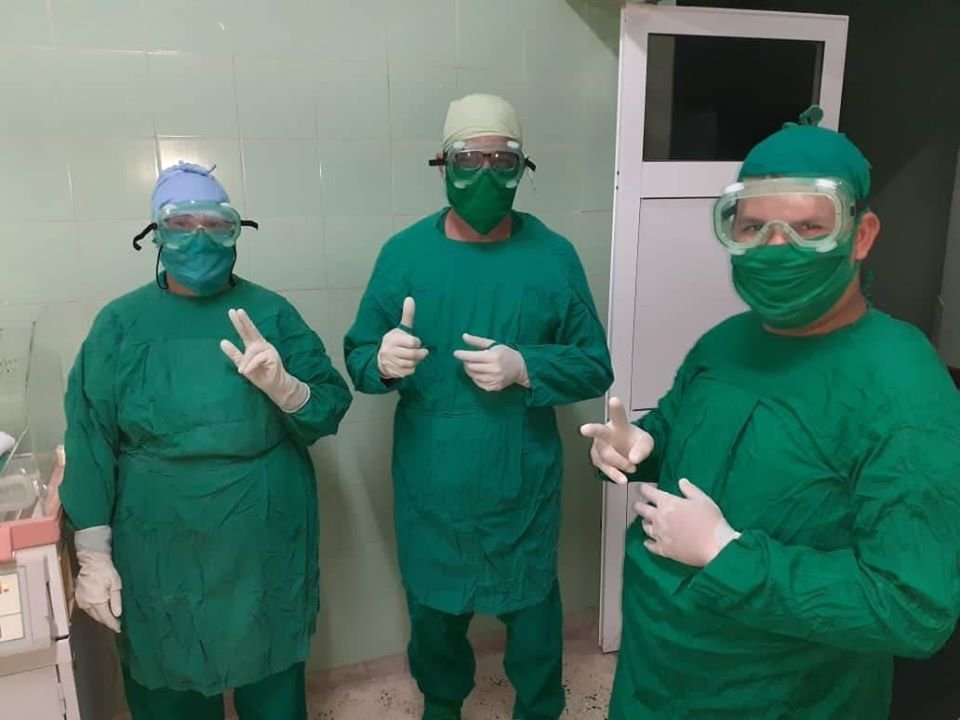
Betty Dodson: The Soothsayer of Solo Sex.
The New York Times
You Are Your Safest Sex Partner. Betty Dodson Wants to Help.
By Ruth La Ferla.
March 26, 2020
Translated by CubaNews
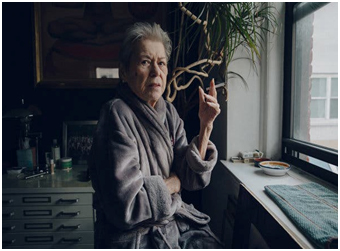
Credit: Celeste Sloman for The New York Times
What does it take to make Gwyneth Paltrow blush? Well, it just happens to take a few explicit lessons on how to tune her pelvic floor. Her instructor, Betty Dodson, an artist turned sex educator and evangelist of female self-stimulation, extolled the benefits of Kegelian exercise, which she says helps bring about orgasm.
“Lift, contract, relax,” she insisted, causing Mrs. Paltrow, seller of a $75 candle called This Smells Like My Vagina, to blush from her chin to her forehead.
The scene is from “The Goop Lab,” a Netflix installment on the Paltrow’s (popular among millennials) life regimen business that marked a milestone for the Dodson, giving her more visibility and possibly more relevance than she’s enjoyed since she began teaching women how to achieve orgasm half a century ago.
“There are younger women educators now,” said Annie Sprinkle, a porn star from the 1970s who became a sex educator and a longtime disciple of Dodson, “but Betty can still give them two turns.
A troublemaker since before the term became fashionable, Ms. Dodson has gained adherents to her ideal of positive sex for decades, urging attendees at the Bodysex workshops she founded in the 1970s to sit naked on her carpeted floor, watch each other’s vulvas and learn how to masturbate effectively.
Even before the New York City Health Department stated “you are your safest sex partner” in a highly publicized memo, Ms. Dodson, now 90, was enjoying a timely renaissance. Her message is echoed in her first manual, “Bodysex Basics,” co-authored by Carlin Ross, and in a reprint of her 2010 memoir, “Sex by Design: The Betty Dodson Story: The Betty Dodson Story]; in the popular monthly workshops she offers in her Midtown Manhattan apartment (now replaced by online group discussions); in the erotic art that first caught the public’s attention (her images of couples copulating, which will be on display this year when the Museum of Sex, of which she is a consultant, reopens); and in www. dodsonandross.com, the website she maintains with Ms. Ross, her business associate and alleged 46-year-old heir.
In “The Goop Lab,” Mrs. Ross lies face down in the half-light of a room. Dodson is on top of her, gently applying oil to her genitals using a gradually accelerating massage technique, and whispering softly as he guides Mrs. Ross to an eventual climax.
If the earth trembled for Mrs. Ross, it was not noticed. Aside from her shaky breathing and the occasional shudder, the audience saw and heard nothing like the sound and visual fireworks that have always been the mainstay of heterosexual pornography.

The accusations were false. But could we prove it?
If it seemed dull by comparison, Ross said, “it’s because it wasn’t an acting orgasm.”
Before the spread of the new coronavirus that forced New Yorkers to isolate themselves, she was chatting in the office-bedroom where they both write and plan their projects.
A golden penis with wings, one of Ms. Dodson’s many curious awards, takes pride of place on one of the top shelves of a bookcase full of videotapes she has promoted-such as “Viva la Vulva”-and several of her early works, including “Sex for One: The Joy of Self-Love,” her landmark first manual (1987) on female masturbation.

Credit: Celeste Sloman for The New York Times
Work tools: Magic Wand Vibrators that Ms. Dodson uses in her workshops
The Dodson made her entrance dressed in a gangly bathrobe whose top pocket is decorated with the letters B.A.D., “my initials, Betty Anne Dodson,” she said squinting before returning to her song.
Of course, the orgasm can be noisy at times. “However, the sounds are usually much more guttural, deep and animalistic,” she said. “The legs shake, the whole body trembles. I’ve never seen that in pornography.”
Why then do so many women feel compelled to put on a show enriched by a soundtrack of moaning and heartbreaking screams? “Men don’t want to see a real orgasm, they want porn,” the Dodson pointed out with a sharp edge. “It’s an ego thing. They want to see the kind of effect they have on a woman.”
“A real orgasm,” he added, leaning forward for emphasis, “no matter where it comes from, it’s something that women get.”
Here is a basic precept of his teachings. “You must lead” intercourse, he asks women earnestly: Take charge, that is, actively participate in your own pleasure. If you are with a partner, “Take her to do what you want,” he said almost angrily. “Find the position you want.”
In his opinion, masturbation, whether manual or with battery-powered devices, is the cornerstone of sexual fulfillment, a catalyst for pleasure, and, more than that, the reliable basis for social and emotional independence.
“My instinct told me,” he writes in his monograph, “that sexual mobility was the same as social mobility. Men had it and women didn’t.”
Her commanding, subversive and even inflammatory attitude of the early 1970s did not sit well with some feminists who considered Mrs. Dodson’s notion of mating to be mechanical and unconnected. Moreover, they were too focused on protesting the abuse and humiliation they suffered at the hands of men. “They were always complaining,” she recalled with irritation.
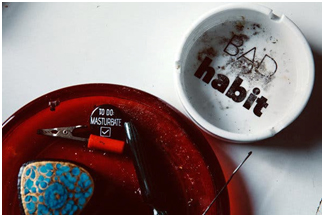
Credit: Celeste Sloman for The New York Times
Other trifles about the Dodson’s bureau.
Shee responded, unflappable, with a model of sexual awareness. The total repudiation of romantic love was vital to his message. “Romance is a very serious thing,” he said in his apartment. “It’s no longer that paradigm that I have to love you and you have to love me back.”
Ms. Ross intervened: “Sex can be playful, more like, ‘Let’s have fun.'”
Ms. Dodson’s epiphany came after a lurid and sexually uninspiring marriage in the early 1960s to Frederick Stern, an advertising manager. The couple did not have children, and the Dodson, who grew up with three brothers and sisters, did not have them in her future plans either. “I saw what my mother went through,” he said. “It’s the most thankless task on the planet.”
Being free to experiment, he explored group sex with women and men, in order, he said in a 1970 New York Times interview, to give up feelings of jealousy and possessiveness “to understand that I could love more than one person.
In time, she became disillusioned. “Organized group sex is kind of like the children’s league of bowling,” she said at the time. “It’s super-compulsive, with frenetic traits. It’s weird.”
She used the small amount she received from her divorce to fund the first of the women’s sex workshops that would become her livelihood and vocation. At these meetings she encouraged the often nervous participants to strip down, discover their bodies and adopt practices that included clitoral massage and the use of the Magic Wand, the hard-to-handle but highly effective vibrator she promotes and sells through her website, Dodson & Ross.
Her short gray hair and wise demeanor invite comparison with Dr. Ruth Westheimer, the cozy and entertaining sex guru of the 1980s. The Dodson doesn’t accept it. “Dr. Ruth is your grandmother with a funny accent,” she likes to say. “You never listen to what she says.”
The comparison is accurate… to a certain extent, Mrs. Sprinkle said. “With Dr. Ruth there are no risks, while Betty is nervous, a permanent explorer of sexuality. She has the kind of experiences even her youngest followers will never have.”
Mrs. Dodson, an artist to the core, has cultivated a character that fluctuates between the rough and the smooth, and sometimes knows how to be mockingly funny. Since her doctor declared her healthy last month after a routine check-up, she started smoking for the first time in years.
“Why not?” she said with a snort, “I’m going to live forever.” But when Ross suggested that I was free to light a cigarette whenever I wanted, she was upset. “I’ll decide when to smoke.”
Mrs. Dodson’s teachings, innovative in their time, are unlikely to frighten young women who grew up watching pop idols like Miley Cyrus, Nicki Minaj and others who are suggestively caressed in both their videos and concerts.
Also, the lyrics of their songs make self-stimulation seem as normal as going out and shopping. “Oh what an ordinary day,” sings Annie Clark, known professionally as St. Vincent, in her single “Birth in Reverse” (2014). “Take out the trash, masturbate…”
Young people can immediately turn to online guides such as “How to Masturbate, Female Style: 8 Steps to Having Orgasms” in Bustle, with handy instructions, as the author writes, “because knowing several ways to have an orgasm is a skill everyone should have.
Similar naturalness supports the somewhat simplistic claim of Flo Perry, a 27-year-old British writer and illustrator, in “How to Have Feminist Sex: A Fairly Graphic Guide,” that masturbation is not much more than “a form of self-care.
However, some of the younger girls seem to prefer Ms. Dodson’s manual approach (if you’ll excuse me). The lessons she offers on the Internet have many clients, about half of whom are between 24 and 40 years old, according to Ms. Ross. Few can respond to the outpouring of anger that characterizes Dodson’s writing and fuels her conversation.
In her paper, she recalls the case of an older friend who made a touching suggestion to her best friend. The Dodson grabbed a knife from above the cutting board and angrily said, “You better leave before I stick this knife in your stomach.”
In other cases, however, Mrs. Dodson seems inexplicably cooperative. In her writing she describes an encounter in her backyard with a half-naked stranger, who approached her threateningly from behind. Feeling that the man was about to pounce on her, she turned around, unbuckled her seatbelt, pushed him into a chair and rode on top of him.
It’s an amazing incident to read about, especially in the era of #MeToo, when Dodson’s seemingly cavalier attitude sounds like heresy. But she’s not willing to back down. “If you don’t know martial arts,” she says, resisting a man during an attack “is useless in most cases. Men are bigger and stronger. I don’t care how many reasons you have: fighting doesn’t work.”
Your relationship with the more robust sex can be sourly dismissive. “Men are very two-dimensional,” he said. “If there’s anything interesting about them, it’s the women they’ve been with.”
Ms. Ross reminded the Dodson that at the age of seventy-something she had a 25-year-old lover, with whom she lived for a decade. For Mrs. Dodson, the memory still sparks.
“He was so beautiful,” she said amidst nostalgic sucking on a Marlboro Light. “He had the perfect body, broad shoulders, good-sized genitals and strong bones. Oh, and he smelled so good! With that youth and lots of soap and water.”
“I’m done with partner sex,” he continued. “But I wouldn’t turn down a good-looking guy if he came in here now.”
Not having a partner is no reason to leave the field, he added, as if such a thing, confiding in me that he still smokes marijuana occasionally (“Without it I wouldn’t be here.”), sometimes as a prelude to casual sex alone. There’s no point in lying around idly waiting for desire to take over.
“We feel the desire once we get aroused,” he said. “Don’t wait for your spirit to move you, because it never will.”
A version of this article is printed on March 26, 2020 in Section D, Page 1 of the New York edition, under the title: The Soothsayer of Solo Sex. Order Copies : Today’s Newspaper : Subscribe
In China, the Battle Continues

In China, the Battle Continues
By Carlos Miguel Pereira Hernández
March 22, 2020
Translated and edited by Walter Lippmann for CubaNews.

Image: Cuba’s Blog in China.
As you know, there has been encouraging news of the last few days in China indicating substantial progress towards controlling the spread of the virus at the mainland level. Together with the strengthening of quarantine measures in major cities to stop the upsurge of new cases “imported” from abroad, are reflected important changes in the scenario we have experienced in recent weeks.
While cities such as Wuhan and others, considered epicenters or areas most affected by the epidemic could move towards a gradual relaxation of the quarantine measures imposed, others such as Beijing and Shanghai will have to remain under strict mandatory quarantine measures for those arriving by air from abroad. This will involve adjustments to air routes, with previous stops in other cities and even changes in the planned destinations of international flights, as part of the measures taken to control the upsurge of new cases arriving from abroad. Only six new cases were reported in Beijing in this way.
The situation in Hong Kong, Taiwan, and Macao still remains complicated, although the trend of increasing new cases is also showing an encouraging slowdown.
As it is known, the situation of all our colleagues and relatives in China has remained unchanged and uneventful. This is largely thanks to the joint efforts of all and the discipline maintained in complying with the measures indicated. However, while the situation here is improving after two very critical months, in the rest of the world, including our country, it is tending to worsen and become more critical. That is why we must redouble our efforts so as not to compromise what has been achieved, to avoid complacency and, at the same time, to prepare for a gradual return to normality.
These have been intense days. In addition to taking care of ourselves and preserving the health of our collective to the maximum, it has been necessary to deploy an intense battle for the truth in our networks. [We want] to close the way to the lies and manipulation that have proven to be more contaminating and lethal viruses than COVID-19 itself. From our pages in different platforms, we responded to incredulous and manipulative people about the successful use of nebulized applications of Cuban interferon manufactured in the Changheber plant, both from the preventive point of view by the Chinese medical staff before attending the patients and in the treatment itself of the patients infected with the virus.
Just a few days ago, when we were in the midst of that other battle, in an inexplicable way, Facebook, based again on its questionable algorithms, surprisingly deleted the official page of our embassy, from which we had been informing the world in an objective and systematic way about what had happened in these long months of the epidemic, the situation of our compatriots and the work of the diplomatic mission and the consulates in the People’s Republic of China.
However, Cuba’s commitment to the truth can never be erased, not even with all the clicks in the world. Barely 24 hours later, a new page was created from which we have followed and will continue to disseminate to the world our bilateral work, as well as reiterating our support and recognition to the Chinese people and government. [In addition, there are such] humanist acts as the decision to receive the British cruise ship infected with COVID-19 in Cuban territory to enable its passengers to return to their countries of origin, or the decision by China and Cuba to send medical brigades and to strengthen international cooperation as the only effective way to win this battle for life.
Taking into account the evolution of the situation in China, the embassy, the consulates general of Shanghai and Guangzhou, the Cuban representative offices and the Antillean personnel on official missions will continue to implement planned measures, which take into account the persistence of the danger and the call for strict compliance with measures to avoid contagion, in the midst of a gradual return to normality.
The medical post will remain in operation at the embassy headquarters, with the services of the medical team that is among us. It will continue to support us in the important task of providing medical guidance and advice, and also in complying with the medical protocol established since the beginning of the epidemic. Given the current epidemiological conditions of our country, this acquires even greater importance in order to ensure that nationals traveling to our country strictly comply with it. The impeccable implementation of that protocol has enabled dozens of our compatriots to return to the country in good health and no cases of contagion from China have been reported so far.
As it has been reported through different channels, all Cubans who plan to return to the country in the next few days must also strictly comply with the indicated medical protocol, for which they must contact the corresponding consular office and the medical post.
On the other hand, taking into account the evolution of the situation and the gradual reestablishment of face-to-face work by the Chinese institutions, starting tomorrow, Monday, March 23, the Cuban embassy and consulates in China will begin to resume their work in person, which will be done in a flexible manner according to the situation in each locality and in coordination with the respective heads of offices and consulates according to the priorities to be undertaken.
In the case of the Embassy, the following measures will be mandatory:
The mandatory use of masks. Once you arrive at the parking lot and before entering the offices, have your temperature taken at the medical post.
Hands and shoes will be disinfected at the entrance of the Embassy.
No inter-office visits will be allowed and only those meetings duly authorized and coordinated by the embassy management and with the measures duly taken.
Do not use common glasses, cups or spoons. Each colleague must have and use his or her own.
Meetings with external personnel will be analyzed on a case-by-case basis and with due authorisation and will be carried out in strict compliance with the measures indicated.
It is necessary that the offices are kept clean and aired at least twice a day for 30 minutes each time.
The Consular Office in Beijing and the Consulates General in Shanghai and Guangzhou will continue to provide services as before. Secretaries may be incorporated as long as services are provided for which they are required and with strict compliance with all measures, including the use of nasobuco on a permanent basis. The consulates must permanently have all the resources to ensure prevention and timely disinfection.
In the case of the group of students studying at different Chinese higher education institutions, general compliance with these measures will continue to be observed, and they will have to be adapted to the characteristics of each university and the decisions that will be announced by the corresponding authorities for the current school year. For the time being, the Chinese authorities recommend that students abroad do not return to China until otherwise indicated.
To the resident Cuban community, we reiterate that the embassy and its consulates will remain as they have been up to now, open and in permanent communication with you, to assist and support you in whatever may be necessary. As soon as the situation allows it, we will meet to take stock of what has happened during these days, in which the unity and cohesion of all becomes the main possible and necessary path towards the future.
To all of you, no matter the task or mission that has brought you to China or the migratory status you have today, I reiterate, on behalf of the leadership of our Embassy, that it has been a true honor to have shared these difficult days with you. We have made real the permanent call of President Miguel Díaz-Canel Bermúdez to “think as a country”. At the same time, I congratulate you for the exemplary attitude that has been maintained, which is allowing us to arrive little by little at the goal and to contribute our share in the battle that is being fought. I am not exaggerating if I say that you have been up to the task of our always hardened people and also of the brotherly and stoic Chinese people.
Reciprocal solidarity between Chinese and Cubans has always been present in the common history of our peoples. There are many and countless pages written throughout these years, in which each party has spared no time or effort in supporting and reaching out to the other, in the midst of situations of disasters, epidemics, media campaigns, and unprecedented manifestations of hatred and economic warfare.
These have also been days of deep solidarity and mutual support. Cuba has not only been among the leading countries in supporting and recognizing the epic battle waged by China, which has also been a crusader for the world. But China has also provided its concrete contribution in solidarity in many ways. These include the joint work of experts who have joined forces in the development of new medicines or therapies to confront a disease that, beyond announcements and predictions, remains dangerously unknown. Likewise, Chinese and Cuban doctors are working side by side today to confront COVID-19 in the region of Lombardy, Italy, one of the most affected regions in that country.
More recently, after the appearance of the first cases of the new coronavirus in the country, we have felt the human and supportive accompaniment of the Chinese government and authorities. They were among the first again, as well as their people, their companies, institutions and friends in general, to whom we extend our deepest gratitude. Increasingly, they contact us from all parts of China to send us their encouragement and support and their confidence in the capacity of our country and its health system to face the COVID-19.
As has already been announced by the Chinese authorities, an important government donation is ready, which will be joined by others that will generously send Chinese companies with a long history of links with the Island, including equipment, inputs, and others of great practical value that will reinforce the proven capacity of the Cuban health system to act, always focused on preserving the life of the people. In addition, a modest donation is being prepared by the community of Cuban residents through the Association of Cuban Residents in China “Ernesto Che Guevara”.
The battle continues, there is still much to be done. COVID-19 constitutes a global threat that must be faced with the cooperation and responsibility of all. In its prevention and containment, solidarity and international cooperation is the only possible way.
Beijing, 22 March 2020
Free Distribution of Nasobucos Begins

Free Distribution of Nasobucos Begins
This company belonging to the Ministry of Culture of Cuba, which produces and markets goods for the art industry, is today one of the institutions that have joined the production of nasobucos throughout the country.
By Redacción Cultural
March 23, 2020
Translated and edited by Walter Lippmann for CubaNews.
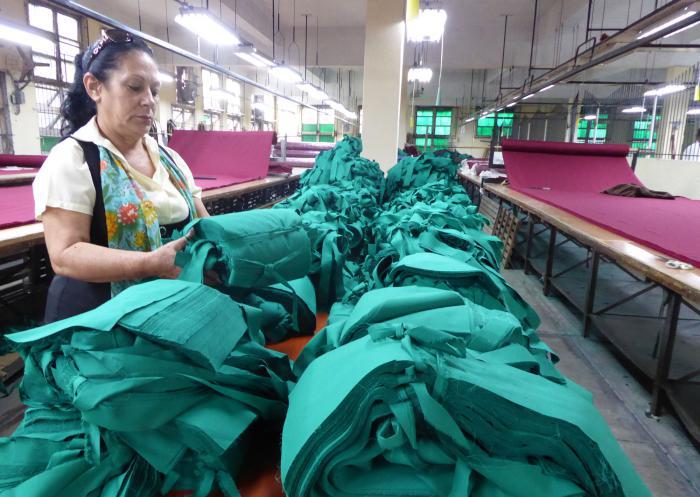
Photo: Germán Veloz Placencia
The National Council for the Performing Arts promotes the actions of Tecnoescena, a company belonging to the Cuban Ministry of Culture that produces and markets goods for the artistic industry, and which today is one of the institutions that have joined the production of nasobucos throughout the country.
According to José Martínez, its deputy director, this company is producing this add-on for free distribution, guaranteeing, fundamentally, the national schools of the artistic education system, as well as in the Theater and Dance centers of Havana, in some groups, among which is La Colmenita. Other cultural institutions, whose work will interact with the public,will also benefit, specifically in the area of tourism.
Tecnoescena is joined by three groups of artistic creators from the Cuban Fund for Cultural Goods (FCBC) in Ciego de Avila, who have made available to their province 5,000 nasobucos, made by them.
These timely initiatives are those that reinforce the action of the country’s main organizations, focused on the work of preventing the new coronavirus. (Cultural Editor)
Does Panic Help in Pandemic Situations?

Covid-19:
Does Panic Help in Pandemic Situations?
By Danay Galletti Hernández
March 24, 2020
Translated and edited by Walter Lippmann for CubaNews.
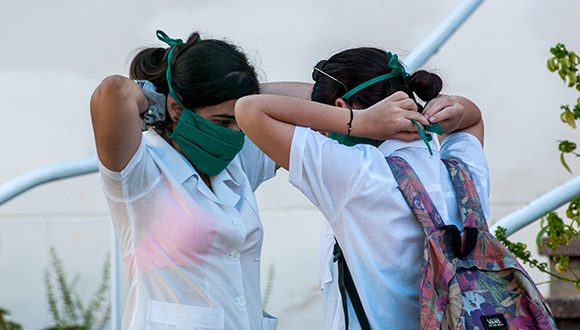
Medical students during the investigation of COVID-19. Photo: Abel Padrón Padilla/Cubadebate
Hysteria is as dangerous as social apathy, said Dr. Annia Duany, head of the Psychiatry Group at the Hospital Docente Clínico Quirúrgico Salvador Allende in Cuba, She said that confidence in the social measures taken in Cuba against COVID-19 is essential.
Panic does not help in pandemic situations and a favorable mood affects the prevention and treatment of diseases, Dr. Duany told Prensa Latina.
“It’s normal in this situation for people to experience nervousness, worry, anxiety and fear, but it’s essential to have positive coping resources. Examples being with family, seeking reliable and safe information, doing tasks and enriching our spiritual world,” he said.
On the other hand, Dr. Ana Sarracent, head of the Psychiatry Group at the Calixto Garcia Hospital, explained that although there is a risk of contagion at any age, epidemiological research indicates that those over 60 are more vulnerable to Covid-19.
“In these cases, family support is transcendental because they are more sensitive from the psychological and organic point of view. Also, extreme care and hygiene must be taken, as well as those with nervous or cognitive disorders, to ensure that they enjoy positive and happy materials,” she said.
The research work implemented to identify flu symptoms in the population and possible cases of the pandemic also reveals a significant number of adults who live alone and, therefore, need community support, Sarracent added.
They tend to have a hypochondriacal view of diseases and their situation of loneliness, as well as a diverse perception of the news broadcast on the subject, he said.
In coming days, numerous Cuban residents will arrive in the Caribbean nation and will be under isolation in response to a protection measure. The family, far from being distressed or depressed, must be aware and assume it in an appropriate manner, he said in reference to the most recent measures taken by the authorities.
About the children and how they should be treated in this context, Dr. Mabel Whilby, head of the Infant-Juvenile Group at the Pediatric Teaching Hospital of Cerro, Havana, explained that this sector of the population has different stages in psychological development and should receive information age appropriately.
The family must convey to the children that this situation will soon return to normal and then they will be able to play again with their friends, she said.
Children also have emotions, sadness and fears and must channel them, and at the same time, their parents must instill security and confidence in them through play, she added.
In this sense, conversations between adults cannot take place in front of children because they are too aware of the signs of how adults handle this situation, as they are patterns to imitate.
The specialists agreed on the importance of risk perception and insist that isolation and surveillance in homes be assumed with appropriate behavior: avoiding alcoholic beverages, smoking or neglecting eating habits.
Questions and rumors about COVID-19
Winning First Place Through Prevention

Winning First Place Through Prevention
A difficult, but not invincible rival, appears in our geography. It needs to be defeated, in the purest sports jargon, with a KO.
By Gladys Leidys Ramos
March 23, 2020
Translated and edited by Walter Lippmann for CubaNews.
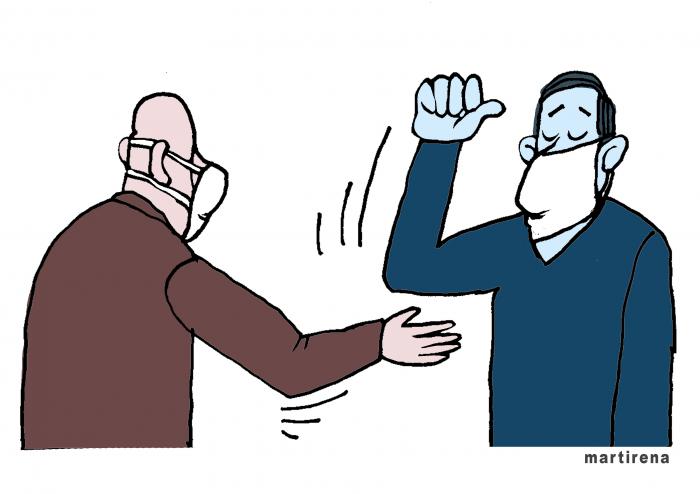
Photo: Granma Archive
A difficult, but not invincible, opponent appears in our geography and needs to be defeated, in the purest sporting jargon, with a KO. Victory will not be rewarded with a gold medal, but with the most brilliant prize: life. For this, we have the best Cuban team: the national health system and our families.
The game will be tense, long and with constant strategies, at the height of the best game of chess, basketball or baseball. The Cuban people and all its institutions will fight for the ultimate victory.
The rapid spread of the new coronavirus, which causes Covid-19 disease, has set off alarm bells all over the world. A total of 171 countries, among them 41 Latin American and Caribbean peoples, are being threatened by this pandemic. However, Cuba has the necessary conditions for its prevention.
The measures taken by the country’s leadership and the national health system are intended to avoid any vulnerability that could undermine the well-being and quality of life of every Cuban. In this effort, the Committees for the Defense of the Revolution are holding health meetings throughout the country to help raise the perception of risk of this disease.
In the People’s Council of San Francisco de Paula, in the capital city of San Miguel del Padrón, one of these debates was held on the causes and consequences of the new coronavirus, its forms of propagation and the actions that should be taken to reduce the possibilities of infection.
“The objective of this meeting is to keep the population prepared. I insist on hygiene precautions for each person: washing hands with soap and water or alcoholic solutions; also cleaning surfaces with this type of product. Primary care, where the actions begin, is ready and trained to deal with this phenomenon. In the polyclinics and clinics, all the personnel are working to keep the information on the subject up to date,” Luelsis Hernández, director of health in the municipality, told the residents of the popular council.
Sandra Layón, coordinator of Zone 55, expressed her concern, specifically with the population of San Francisco, because she believes it may be vulnerable. “There is talk that the fundamental basis for containing the infection is the doctors’ offices, but I think that the work of the doctors and nurses in our territory should be intensified, in the field, which is the main scenario for detecting cases.
On that point, Hernandez Torres said that although there are 20 doctor’s offices in that community, and each one has doctor and nurse coverage, he agreed with the call to defeat this disease.
Risk perception and prevention are key against the coronavirus. Although the work of health specialists is essential in preventing phenomena like this, the will and responsibility of each one is equally important.
Nurse Maria Hernandez called for responsibility and discipline in the investigations that are currently being carried out in the area,, This is one way in which the primary health care network can rule out or identify any case of infection by the virus.
Idania Bastida, a pharmaceutical worker, agreed with her and called on all the inhabitants of the popular council to be able to maintain the hygiene of the community with the resources they have.
“It is important not to form gatherings on street corners, especially now that we have several collectors. We must also respect the schedules for dumping that waste. We know that there are places where trucks cannot gain access due to the geographical characteristics of our town, but that is why the collectors were installed on the corners,” said the ceding company.
Adis Aba Escalona, an official of the Federation of Cuban Women, took advantage of the occasion to inform the residents that the creative women in the municipality are working on making nasobucos, as a protective measure.
“For that reason, we are calling on everyone who knows how to sew to join in this work and complete as many as possible, not only in San Miguel del Padrón, but also in the entire capital and, if possible, in the country.
Jan Carlos Serabay warned of the need for young people, as a sector that can be vulnerable due to the low perception of risk, to contribute individually and collectively, not only to avoid infection in their age group, but also to transmit information from social networks, so that Cuban society becomes informed and aware.
On the other hand, Dr. Dairis Escobar recalled that, unlike other peoples, our country has the possibility of taking effective measures. “We take measures so that every Cuban becomes a protagonist and communicator of hygiene actions and discipline from the workplace and the home; for that we do not need greater material resources, only the perception of risk and the willingness of each person to take care of themselves and others.
The health system is doing its job, from the preparation of each worker in the sector, doctors, nurses, cleaning staff, laboratory workers, etc., to the conditioning of rooms in hospitals, to wait for admissions with everything ready,” he added.
Our Duty is to Protect People

Our Duty is to Protect the People
Personal will and medical responsibility drives Alexander Labrada Torres every day to fiercely guard the border of Isla de la Juventud in the face of the COVID-19
By Roberto Díaz Martorell
March 23, 2020
Translated and edited by Walter Lippmann for CubaNews.
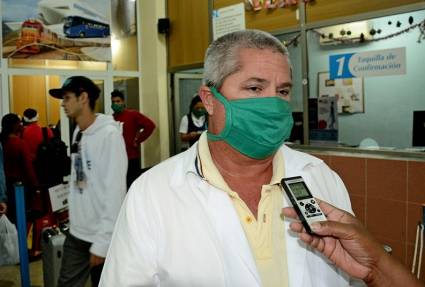
Dr. Alexander Labrada Torres is one of the many Cuban doctors protecting the borders to prevent the entry of the new coronavirus. Author: Roberto Díaz Martorell Published: 23/03/2020 | 08:55 pm
Nueva Gerona, Isla de la Juventud – The alarm clock sounds at 5:00 a.m. and Dr. Alexander Labrada Torres turns it off instinctively. His tired body resists getting out of bed, but the responsibility as a doctor gives him the final push and, as he did several weeks ago, he gets ready to do her duty.
At his side, his wife, Yuraika Gonzalez, diligently prepares breakfast and helps with the backpack. Nothing can be left behind: gloves, nasobuco (mask), cap, the water to drink, the glass…, and the kiss goodbye after the strong coffee to recharge the batteries. Alex goes out on his bike and travels the distance between his house and the Passenger Boarding Terminal in Isla de la Juventud, where he is the head of the border service dealing with COVID-19.
“Responsibility is inherent in every doctor and you comply with corresponding rigor, especially when it is your turn to look after the health of more than 500 people every dayl There are are two trips more than a thousand, in addition to the crew. In addition, each person conducts himself in a different way and sometimes it is very difficult to dialogue,” he says while organizing the work at the terminal.
First, he prepares with all the established attachments for cases like these, then he distributes the resources to the workers who, are obliged to interact with the people and watch over the fulfillment of the foreseen measures. It stops. He observes that everything is going well and he almost smiles.
“It is my responsibility to monitor every boat that leaves or arrives on the Isle of Youth; I do it together with the nurse on the catamaran to check the temperatures and the active search for any respiratory symptoms. The first trip begins with the check of bulletins from 5.30 a.m., and when we set sail, contact with the director of the entity along with the board of directors to assess the implementation of health and hygiene measures in all its units.
“And if it were only one trip, it would end with the reception of the boat around 3:00 or 4:00 p.m., but on Mondays, Wednesdays, and Fridays there are two,. On the second one, the control begins around 2:00 p.m. That second trip arrives in Nueva Gerona after midnight and sometimes until 4:00 a.m., and already at 5:30 a.m. a new day begins.
“I am very grateful to my wife; without her support, it would be very difficult to complete these schedules, I almost always arrive at the house to eat and sleep. I almost always arrive at the house to eat and sleep. While keeping myself informed of the hygienic and epidemiological situation of the country and the municipality,” he says, taking a seat to “refresh” the tiredness caused by the intensity of the work and sleeping after hours.
But Alex is not satisfied yet; he still thinks that a large part of the population does not understand the magnitude of the situation and maintains inadequate behavior. “The fact that, in Isla de la Juventud, there are still no confirmed cases of COVID-19 does not eliminate the conditions of vulnerability for contagion and that is avoidable if the measures of the Ministry of Public Health are fully complied with,” he explains.
“I get tired and I get better; fulfilling my medical responsibility is the daily vitamin I consume. We can’t afford not to identify a COVID suspect, because I know that with my work I’m protecting an entire island that expects the best from me,” he says.
At the Viajero maritime terminal in Nueva Gerona, no confirmed positive cases are reported, but they are on high alert. Any respiratory or feverish symptoms are monitored in those who leave or enter the territory by this route. “Here we have a post or isolation room, health hearings are held for passengers during their stay. Also, when they board the boat they disinfect their hands with sodium hypochlorite,” he explained.
During the trip to the port of Batabanó, the catamaran carries a nursing staff with the necessary medical supplies to act in case of an emergency and also during the three hours of travel is observed the conduct of passengers, if necessary to activate the protocol provided.
Alex tells us that the most critical day happened with the first Italian who arrived in the territory with catarrhal symptoms and he was on duty at the General Teaching Hospital Héroes del Baire. “Everything was very fast, with no time for training, and we didn’t have much knowledge of the disease. It was a long night without sleeping and I was worried, because I didn’t know what would happen in the morning. Luckily it was negative; the patient only had to be treated for pneumonia.
“I have been counting the days for two weeks in a row, but I have the confidence and assurance that my personal actions are helping to keep this little island free of the coronavirus. And I know that, like me, there are thousands in the country who keep a permanent watch on our borders; a hug for them and we continue to fight. Our duty is to protect people and we will do it,” he emphasized.
Subscribe to Blog via Email
| M | T | W | T | F | S | S |
|---|---|---|---|---|---|---|
| 1 | 2 | 3 | 4 | 5 | 6 | 7 |
| 8 | 9 | 10 | 11 | 12 | 13 | 14 |
| 15 | 16 | 17 | 18 | 19 | 20 | 21 |
| 22 | 23 | 24 | 25 | 26 | 27 | 28 |
| 29 | 30 | 31 | ||||

You must be logged in to post a comment.